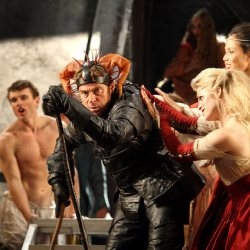Rigoletto (Royal Opera House)
David McVicar’s dark production of Verdi’s ever-popular opera returns in a strongly-cast revival that is not without problems

© Catherine Ashmore
It helps to have a distinctive and well-characterised supporting cast, particularly in the infamous opening orgy with its tame eroticism and coy nudity (‘here come those tired old titillations again’). Leah Hausman, the original movement director and on this occasion the revival director, has a rare team at her disposal, with exceptional work from Luis Gomes as Borsa, Sebastian Holecek as Monterone and Duncan Rock as a commanding Marullo.
Rigoletto is the angry clown at the court of the Duke of Mantua. Each day, duty done, he goes home in secret to his beloved daughter, Gilda, whom he shelters from the perils of a world he sees as a dangerous, threatening place. He is not wrong; and, when his two lives collide, a nightmare begins.
The opening night was one of those rare occasions where all three principals seemed to be struggling. Aleksandra Kurzak‘s voice is an instrument of great beauty (her uvula has an agility made in heaven), but she was beset by tuning issues and gave a distinct impression of vocal tension during her early scenes. The Duke, Saimir Pirgu, has a handsome tenor voice but he too tended to veer off course and err north of the notes. As for Simon Keenlyside in the title role, his delivery lacked Verdian coloration – how I longed for an Italianate mezza voce – and there was an edge of gravel to his tone.
'Where it was good, this revival was very, very good'
All of these fine singers came good in act three – a big relief and enough, I hope, to hearten anyone with tickets to see Rigoletto later in its run when the nerve gremlins will probably have settled down.
Even that, though, won’t solve the production’s biggest headache. Put baldly, this was one of the most poorly conducted operatic performances I can recall witnessing. Maurizio Benini may not have made too many friends on his previous Covent Garden appearances but he’s never before actively damaged the listening experience. Here he did – and there’s surely a causal connection between that and the singers’ vocal problems. The ensembles were fine, but whenever things got lyrical the conductor became intractable. Kurzak and Keenlyside in particular fought against his lethargic tempos throughout their father-daughter duet in act one and, crucially, in their dramatic final farewell. The orchestra played shoddily for him as the speeds grew ever more leaden, and the urge to wind him up was irresistible. He certainly wound me up.
Where it was good, though, this revival was very, very good. It would be hard to imagine a more black-hearted assassin than Brindley Sherratt‘s baleful Sparafucile, nor a more calculating Maddalena than Justina Gringyte. What a glorious pair of villains they are! Performed as well as this you can’t help wishing Verdi had written them an opera all their own.













